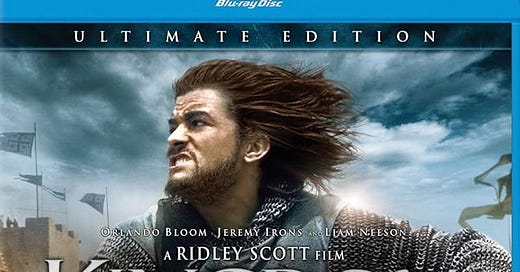Kingdom of Heaven - Blu-ray (Ultimate Edition)
As part of a two week one-movie-per-night binge last October I watched Kingdom of Heaven for the first time. It was the Ultimate Edition, i.e., director’s cut, on 1080p Blu-ray. This movie was from among a number of Blu-rays for films that always interested me but I just never got around to watching over the years. And I’m now finally enjoying and reviewing them through 4K Blu-ray on an OLED TV.
The Blu-ray quality is quite good. Everything looks great in 1080p resolution. Kingdom of Heaven is a handsome looking film with some very fine cinematography.
Of course for a historical drama film like this the costuming, art and set design, and makeup have to be excellent for the viewer simply to buy-in. And for my taste they are all definitely good enough to accept them at face value. But I would add that by the same token nothing wowed me about those physical details. As was the case with, say, Barry Lyndon or The Last Emperor.
The large scale battle scenes combined CGI (the same Massive software used by Lord of the Rings) to digitally create the thousands of soldiers, and for the destruction wrought by trebuchets. But there was also practical effects from use of scale models for the war machines’ attacks on city walls and within the city. The hand-to-hand fight choreography is fairly well-executed and graphic. Here again, it is done well enough to accept as realistic feeling. But it doesn’t deliver the wow factor of large scale battle that, say, Lord of the Rings does.
It is a well made film, though. And there are some things I definitely respect about it. I’m the better in some ways for having watched it because it invites me to reflect on the medieval Crusades. But I can’t say that it struck any sort of deep emotional chord within me, at least for the initial watch.
If I watch it again it will be with AirPods or headphones since a good deal of the dialogue is delivered in soft, whispery, breathy tones against a comparatively loud music score. But mainly, the core takeaway I came away with mentioned at the end of the review is something I can look for more intentionally during a second watch. So I might have another go at it somewhere down the line.
The movie does convey the sense of endless brutal warfare as a slog that over time simply wears down the human soul and will. But there’s also a lot of romanticism going on by Scott about the historical events of the Crusades during that time. I can live with that as a work of art. But it created a dilemma for me. The movie made me feel that this story is basically screwed whatever it attempts. If it remains mostly historically accurate then that’s just… depressing. And maybe even boring as well. If the film is grounded and realistic about the sheer grind of the Crusades then the movie won’t give us hero myth tropes, arcs, and plot beats that we’re accustomed to for a historical epic. So given that choice I think Scott understandably chooses the romantic fantasy direction.
But the attempt to find some sort of heroic moral center to all that brutality, and to the moral contortions of both sides in order to rationalize the Crusades, is probably bound to be disappointing. In all of that chaos and insanity the protagonist Balian displays humanistic values that I’m pretty sure as far as we know do not really begin to take shape until the European renaissance. Could someone in those times maybe have been able to think outside the box at place the highest value on human life? And perhaps then too, implicitly, to place high value on some sort of decent quality of human life? To have basic human empathy, respect, and even love for other human beings because that is simply the right thing to do as a human being? And beyond that to make their code of honor as a knight to chivalrously protect those fundamentally humanistic principles? I guess maybe. In theory perhaps. Maybe Balian could be an outlier ahead of his time. I’m no medieval historian. But based on what I do remember from history courses in college, to my mind it doesn’t seem very likely!
(Note: I found an interesting article by a history professor on the subject of the movie’s historical accuracy for anyone interested. It’s almost a must-read for any history buff.)
So what Kingdom of Heaven seems to give us is a modern sensibility of what “a perfect knight” arguably means to us today more or less from the vantage of our modern humanistic society, and it superimposes that upon the medieval world of the crusades.
Well… okay… I guess.
But then what are we to do with that emotionally and psychologically? I suppose the fantasy at the heart of this movie can inspire hope that whatever form of cultural brainwashing and propaganda exists at any given time and place in history, the human spirit can—at least in theory, in principle—still somehow nevertheless maybe sometimes arrive at more transcendent truths through sheer force of will. That’s the humanistic form of faith. And Scott, as an auteur, is using a deliberately revisionist version of a “heroic” tale during the Crusades to showcase his faith in humanism.



